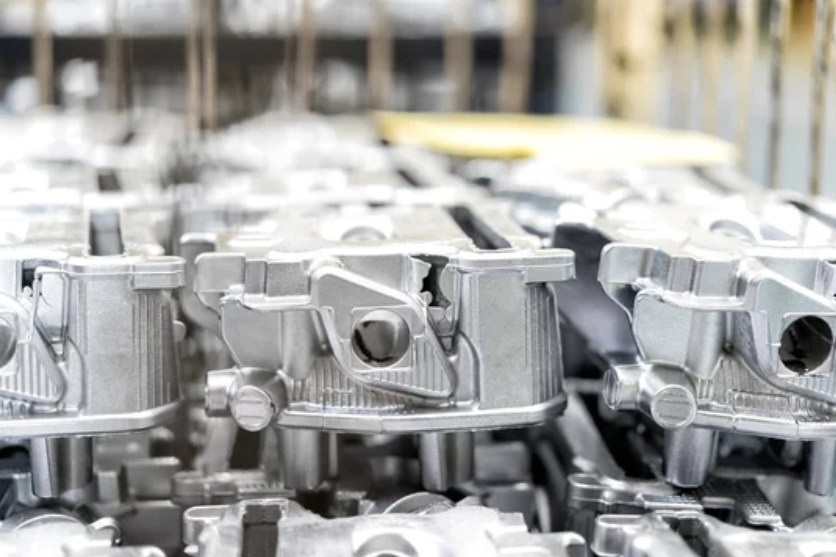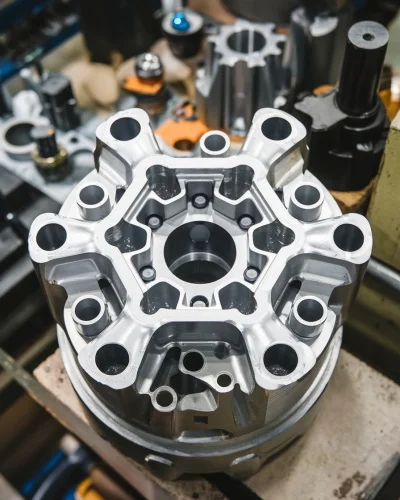The Duty of Light Weight Aluminum Foundries ahead of time Lightweight Manufacturing Solutions
Light weight aluminum shops significantly add to the evolution of lightweight production options. Their ingenious spreading modern technologies produce high-strength, light-weight elements essential for markets such as automotive and aerospace. This development not just improves item efficiency but also promotes sustainability via the use of recycled products. As these factories adjust to emerging technologies and methods, they pave the means for future growths in manufacturing efficiency and environmental obligation. What exists ahead in this transformative trip?
The Benefits of Lightweight Materials in Production
As industries progressively look for performance and sustainability, the adoption of lightweight materials in production has actually arised as an essential approach - Aluminum Casting Company. These materials, specifically aluminum and compounds, supply various benefits that enhance production procedures and product performance. Largely, their lowered weight adds to reduce energy usage throughout transportation and procedure, bring about significant cost financial savings
Lightweight products assist in the layout of more complicated geometries, permitting for greater advancement in item development. This adaptability typically results in enhanced performance and efficiency, dealing with the advancing needs of modern-day customers.
Additionally, using lightweight products can enhance the long life of products as a result of their resistance to corrosion and fatigue. This durability not only reduces upkeep costs but also supports sustainability efforts, as longer-lasting items contribute to much less waste. To sum up, the benefits of light-weight products are essential in driving efficiency, development, and environmental obligation in manufacturing.
Developments in Light Weight Aluminum Spreading Technologies
Current advancements in aluminum casting innovations are transforming the production landscape, specifically in the production of light-weight components. Innovations such as high-pressure die casting and vacuum cleaner die spreading have actually substantially boosted the precision and surface coating of light weight aluminum components - Aluminum Foundry. These techniques permit the creation of complex geometries while minimizing material waste and boosting mechanical residential properties

In addition, the execution of real-time monitoring systems ensures quality assurance throughout the casting procedure, bring about even more constant product outcomes. Jointly, these innovations not only improve the efficiency of aluminum parts however also sustain the sector's shift towards even more sustainable production methods.
Applications of Aluminum Parts in Numerous Industries
While light weight aluminum parts have long been used in various markets, their convenience and light-weight residential or commercial properties remain to drive innovative applications across fields such as automotive, aerospace, and building. In the automobile market, aluminum is significantly made use of for engine blocks, wheels, and body panels, boosting gas efficiency and performance. Aerospace makers leverage light weight aluminum for aircraft frameworks and elements, profiting from its strength-to-weight proportion to boost gas economy and payload capacity.
In the building market, aluminum is favored for home window frames, roof covering, and architectural components, offering toughness and resistance to corrosion while minimizing overall structure weight. Additionally, the electrical and electronic look at here now devices industries benefit from aluminum's conductivity and light-weight nature, using it in wiring, units, and warm navigate to this website sinks. These diverse applications highlight the essential duty of light weight aluminum parts, which not only fulfill industry needs but also add to innovations in product style and capability across multiple fields.
Sustainability and Energy Effectiveness in Aluminum Foundries
The aluminum foundry market plays a vital function in advertising sustainability and energy effectiveness, especially as demand for lightweight components remains to grow across different fields. Factories are progressively embracing eco pleasant techniques, such as using recycled light weight aluminum, which substantially reduces energy consumption and greenhouse gas exhausts contrasted to primary light weight aluminum manufacturing.
Moreover, advancements in casting modern technologies boost energy effectiveness by maximizing the melting processes and lowering waste. Techniques like die casting and financial investment casting permit for specific product use, minimizing excess and scrap.
In addition, numerous shops are spending in renewable power resources to power procedures, even more reducing their carbon impact. Implementing energy management systems allows foundries to enhance and monitor power usage, ensuring they run at peak effectiveness.

Future Trends in Lightweight Manufacturing Solutions
Exactly how will emerging technologies form the future of light-weight production solutions? Innovations such as advanced materials, automation, and additive manufacturing are established to redefine production processes. The combination of smart production modern technologies, consisting of the Net of Points (IoT) and expert system (AI), will enable real-time surveillance and optimization, improving effectiveness and decreasing waste.

As sustainability continues to be a vital problem, lightweight options will significantly concentrate on recycling and reusing materials, aligning with circular economic climate principles. This development in light-weight production will check my site not only improve item efficiency but also add to ecological objectives, making certain that the sector stays affordable in a swiftly transforming market landscape.
Often Asked Inquiries
How Do Aluminum Foundries Make Certain Quality Assurance in Production?
Light weight aluminum foundries guarantee high quality control in production through extensive screening, standardized procedures, and continuous monitoring - Aluminum Casting Company. They apply competent employees and advanced technologies to preserve consistency, lower problems, and fulfill sector criteria throughout the production process
What Are the Main Tests Faced by Aluminum Foundries?
Aluminum factories encounter challenges such as varying basic material prices, preserving production effectiveness, ensuring constant high quality, adjusting to technical developments, and conference ecological regulations, every one of which impact their general operational effectiveness and competitiveness in the market.
How Does Light Weight Aluminum Recycling Effect Factory Procedures?
Light weight aluminum recycling considerably improves shop operations by minimizing resources prices, lessening energy consumption, and reducing ecological effect. This lasting practice allows factories to improve performance while fulfilling enhancing demand for light-weight, high-performance light weight aluminum items.
What Abilities Are Required for Employees in Light Weight Aluminum Foundries?
Employees in aluminum shops need skills in metallurgy, machining, high quality control, and safety techniques. Effectiveness in operating equipment, understanding alloy homes, and problem-solving are also necessary for reliable production and keeping high security standards.
How Do Light Weight Aluminum Foundries Handle Waste Management?
Light weight aluminum factories handle waste via reusing scrap steel, making use of effective waste segregation methods, and sticking to ecological guidelines. They execute sustainable practices to reduce landfill payments, making sure that harmful products are taken care of properly.
Light weight aluminum shops substantially add to the evolution of lightweight manufacturing solutions. Recent innovations in aluminum spreading technologies are reinventing the manufacturing landscape, particularly in the production of lightweight parts. While aluminum parts have actually long been made use of in numerous industries, their flexibility and lightweight homes continue to drive ingenious applications throughout sectors such as vehicle, aerospace, and construction. Additionally, the electrical and electronic devices markets benefit from light weight aluminum's conductivity and lightweight nature, using it in wiring, units, and warm sinks. The light weight aluminum factory industry plays an important role in promoting sustainability and power efficiency, especially as need for light-weight components proceeds to expand across numerous fields.